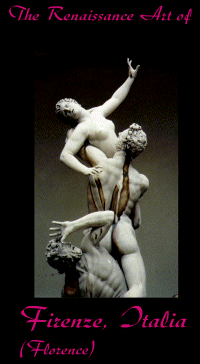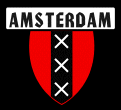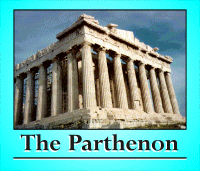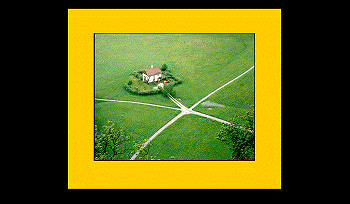
It becomes quite humbling, after seeing the remains of antiquity in Athens and Rome, to think of the artistic achievements of man since. Electricity, the telephone, the internal combustion engine, the jet plane, the telephone, and the microchip are certainly innovations that have manifestly changed what humanity can do, but I believe the achievements of antiquity in sculpture and, to a large extent, in architecture (okay the I-beam changed things a bit too!) have yet to be surpassed.
Michelangelo's "David" is the first achievement I have seen that not only compares with the art of antiquity, but quite possibly surpasses it. It is a surprising contrast to much of Western art because it celebrates the male form rather than the female form. Partially because of this, I would like to add a caveat to my praise of Michelangelo though. I first realized it when I noticed a painting of his near "David". His depiction of women's breasts seems to reveal either a stylistic flaw or a unique dislike for them. The woman's breast in the lower left of his work, "The Flood," at the Sistine Chapel, the "Tomb of Giuliano de' Medici," and the "Tomb of Lorenzo de' Medici" are all good examples of this deficiency or manifest dislike.

The Prado Museum in Spain had some beautiful works of art, especially their collections of works by Goya, Rubens, and Velázquez. The Prado had an unusual collection of works (though not displayed as a unit) which depicted milk coming from a woman's breast (usually the Madonna): a seventeenth century work by B. Esteban Murillo entitled "Aparicion de la Virgen a San Bernardo" shows Mary standing on clouds while holding a baby Jesus and squeezing her breast while a faint stream of milk flows in the direction of San Bernardo's partially open mouth; Alonso Cano's seventeenth century work, "San Bernardo y La Virgen", depicts the same subject, but this time the Madonna's breast is revealed through a triangular slit in her dress and the stream is flowing into the open mouth of a kneeling San Bernardo; and a 1668 work by Peter Paul Rubens, "La Via Lactea", shows a woman, presumably the Madonna, squeezing her breast as milk sprays at a child in three streams.

The house where Ann Frank together with her family and another family hid from the Nazis during World War II is now home to an excellent exhibit. The exhibit began with a statement that it was designed to give a human face to the victims of the Holocaust which it did and more. There was an outline of Hitler's rise to power. Nazi anti-Semitism was examined from Hitler's philosophy in Mein Kampf, to Kristallnacht, and the decimation of the Jewish population in Europe by the Nazis. Also displayed was a letter from a U.S. immigration official to a European Jew of the period explaining in typical bureaucratic language, the complexity of immigrating in this person's particular case. There was a list of Jews accepted by different countries during the period and the U.S. did accept the largest number of any country, but this letter showed in vivid terms, that it was not a simple or definitive issue of immigrating to any country. The exhibit ended in a way that I found gratifyingly unusual for any exhibit connected with the Jewish plight, there were comments on prejudice and hate crimes as they affected different peoples throughout the world today.



I noticed that people invariably gave female beggars outside the small churches in Athens money. The beggars were dressed all in black. It was Good Friday, and I suspect that people's generosity was affected by this.

We saw three gypsy children preying on tourists near the Roman Forum. There were two girls, one with a piece of cardboard, and a boy who limped as he walked probably from an injury he suffered during their enterprise. The cardboard wielding girl approached a middle-aged man holding her cardboard at about his chest to obscure his view of what could be done below it and then, after a few words, the boy tugged on the man's outstretched hand. The man reacted quickly by freeing his arm and stepping back, at which point the dirty rag-a-muffins let him be to search out more docile prey.

In Greece, it is common to see men repeatedly flicking a small strand of beads, sometimes just their keys, in a short flip with their hand at their side. This site became so common to us, that we realized it was a national obsession of sorts just as many businessmen in America can be seen and heard playing with their spare change in their pockets. After arriving in Italy, we noticed an American traveller who had taken the same ferry had adopted the annoying habit of flipping the Greek strand of beads and wondered how long his traveling companions would remain friends with him.

Italian words usually end in a long "o", "a", "e", or soft "a". A note displayed for customers by the management at a laundromat in Florence consisted of sixteen words of which thirteen ended in "i", "e", or "o". Frenchies like to end their words with vowel sounds, but do so in such a way as to often make it sound as if they have clogged sinuses. I haven't figured out Spain yet. Germans are too efficient to resort to such "Romanticisms" though they are guilty of their "sht" rule for "st"-words and the thing they do with their "e"'s at the end of words. Americans are so individualistic that they let just about anyone add a new word to the dictionary with each passing moment.

At a restaurant in Athens, Karen asked for a glass of water, and the waiter replied, "yes please." After our meal, we asked a different waiter for our bill, and he also replied with the "yes please." Could it be that they attended the same English school or were they giving us a Greek linguistics lesson?

The first time we asked for a bottle of acqua, the vendor asked us, "with or without gas?" I thought it was some sort of joke so I laughingly said, "without gas." The second time we were posed the question, we realized that they were referring to the carbonation.
I was surprised to learn that Italians in Rome do not pronounce the word "ciao" like "chow". After several years of business dealings in San Francisco with a person who used the word to end every conversation I was sure it was pronounced so. After carefully attuning my ear, I became convinced that it was pronounced more like "shiao" (in Rome at least).

While in Italy we also learned that Joe DiMaggio's name may mean "Joe of May". I think many baseball fans would add a few other months, but wouldn't have much problem agreeing.
Italians have an affinity for ending business name with "eria" so I developed a short list as proof based on names I saw: anacelleria, birreria, carrozeria, cartoleria, latteria, lavanderia, mestcheria, oreficeria, orologioielleria, pasticceria, polloeria, and profumeria.

Spain posed a formidable challenge to Italy's "eria"s. Within the space of one bloc, I found the following shops: cerveceria, ferreteria, pescaderia, perfumeria, drogueria, cafeteria, peluqueria; and later that day I also saw panaderia, lavanderia, sastreria, zapateria, relojeria, bisuteria, pizzeria, loteria, papeleria, pasteleria, croissanteria, joyeria (we should have spent some time here), corseteria, and lenceria.


It is not uncommon to turn on a radio in a foreign country and hear American music; or see on the streets baseball caps and t-shirts with various American sport team labels on them. American mass culture can be experienced to some degree in most countries of the world. Despite having experienced this many times in many countries it was somewhat of an amusing shock to turn on a television in Austria and hear American cowboys and Indians speaking in German.
I guess if you travel in foreign countries where you can't understand the language and your ability to learn the language is severely limited by the temporal necessity, it may not be so peculiar to develop a fetish for foreign word lists like I have.
It was first in Austria that we noticed a peculiar affinity for German words with the word "fart" in them (of course in German it is written as "fahrt"): abfahrt, alpenfahrt, ausfahrt, einfahrt, hinfahrt, pässenfahrt, rückfahrt, sonderfahrt, stadtrndfahrt, vertärkungsfahrt, vorfahrt, weiterfahrt, zonenfahrt, and zufahrt.



